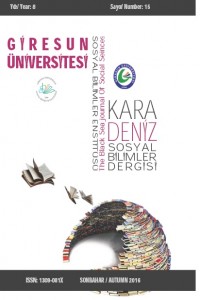Öz
Araştırma, ebeveynlern çocukların matematk eğtmne lşkn görüşlernn ncelenmes amacıyla yapılmıştır. Araştırmanın evrenn Türkye'de çocukları okul önces eğtm kurumlarına devam eden, normal gelşm gösteren 4-5 yaş çocukların ebeveynler oluşturmuştur. Araştırmanın çalışma grubuna, evren çnden Mll Eğtm Bakanlığı'na bağlı bağımsız anaokulları ve anasınıfları arasından tesadüfî olarak, araştırmaya katılmaya gönüllü olan her sınıftan en az k ebeveyn olmak üzere toplam 344 ebeveyn dâhl edlmştr. Araştırmada genel tarama model kullanılmış olup, ver toplama aracı olarak çocuklar ve alelerne lşkn genel blgler toplamak amacıyla “Genel Blg Formu” ve ebeveynlern çocukların matematk eğtmne lşkn görüşlernn ncelenmek amacıyla orjnal formu Amerka'da Buldng Blocks projes kapsamında Clements ve Sarama (2000/2014) tarafından gelştrlen ve araştırmacılar tarafından formun orjnal temel alınarak geçerlk çalışması yapılan “Okul Önces Programda Matematk Eğtm Değerlendrme Ebeveyn Formu” kullanılmıştır. Araştırmanın amacı doğrultusunda elde edlen verlern analznde; frekans ve yüzde dağılımları kullanılmıştır. Araştırma sonucunda, ebeveynlern büyük br çoğunluğunun çocuklarının matematk gelşm le lgl temel kavramları bldkler, günlük etknlklern temel br parçası olarak çocukları le TV zledkler, evde blgsayara sahp oldukları ve çocuklarıyla eğtmsel ve eğlence amaçlı blgsayar oyunları oynadıkları tespt edlmştr. Ayrıca ebeveynlern çoğunluğu öğretmenn eve haftada br-k kez matematk etknlğ gönderdğ ve bu etknlklern çocukların matematk öğrenmesn destekledğn bldrmşlerdr.
Anahtar Kelimeler
Kaynakça
- Akyüz, G. (2013). Öğrenclern okul dışı etknlklere ayırdıkları süreler ve matematk başarısı arasındak lşknn ncelenmes. Elektronk Sosyal Blmler Dergs, 12, 46(112-130).
- Anders, Y., Rossbach, H. G., Wenert, S., Ebert, S., Kuger, S., Lehr, S., et al. (2012). Home and preschool learnng envronments and ther relatons to the development of early numeracy sklls. Early Chldhood Research Quarterly, 27, 231-244.
- Anderson, D. R., Huston, A. C., Schmtt, K., Lnebarger, D. L., & Wrght, J. C. (2001). Early chldhood televson vewng and adolescent behavor: There contact study. Monographs of the Socety for Research n Chld Development, 66 (1), Seral No. 264.
- Blevns-Knabe, B., Whtesde-Mansell, L. & Selg, J. (2007). Parentng and mathematcal development. Academc Exchange Quarterly, 11, 76-80.
- Cannon, J., & Gnsburg, H. P. (2008). “Dong the Math”: Maternal belefs about early mathematcs versus language learnng. Early Educaton and Development, 19(2), 238260.
- Clements, D. H.,& Sarama, J. A. (2000/2014). Parent Questonnare [Early Mathematcs]. Denver, CO: Unversty of Denver.
- Clements, D. H. (2002). Computers n early chldhood mathematcs. Contemporary Issues n Early Chldhood, 3(2), 160-181.
- Clements, D. H., & Sarama, J. A. (2009). Learnng and teachng early math. New York: Routledge.
- Comstock, G. A., & Pak, H. (1991). Televson and the Amercan chld. San Dego, CA: Academc Press.
- Çamlıbel Çakmak, O. (2010). Okul önces eğtm kurumlarında ale katılımı. Abant Izzet Baysal Ünverstes Sosyal Blmler Ensttüsü Dergs, 20(1), 1-17.
Öz
Ths study ams to nvestgate parents' vews on chldren's mathematcal educaton. The populaton of ths study conssts of the parents havng chldren who are 4-5 years old and n normal developmental range attendng preschool classrooms n Turkey. The sample group conssts at least two parents who voluntered to partcpate n the study from each classroom, 344 parents n total, that was drawn randomly among the ndependent preschool and preschool classrooms afflated to the Mnstery of Educaton. Survey method was used n the present study and as data collecton tools, “General Informaton Form” was used to obtan the demographc nformaton of parents and ther chldren and “Evaluaton of Mathematcal Educaton n Preschool Educaton Program-Parent Form” was used to nvestgate parents' vews on chldren's mathematcal educaton, whch was orgnally developed by Clements & Sarama (2000, 2014) as part of “Buldng Blocks Project” n the Unted States, and translated and adapted to Turksh, based on the orgnal form, by researchers. Consderng the purpose of the research, descrptve statstcal methods, frequency and percentage dstrbuton, were used n the analyss. The results of the study showed that, the majorty of the parents know the basc mathematcal concepts of chldren's math educaton, watch TV wth ther chldren as a man actvty part of daly actvtes, and the majorty of the parents stated that they have computers at home and ther chldren play computer games for educatonal and fun purposes. In addton, the majorty of the parents ponted out that the teachers s end home math actvtes at least one-two days a week and th ese actvtes support ther chldren's mathematcs learnng.
Anahtar Kelimeler
Kaynakça
- Akyüz, G. (2013). Öğrenclern okul dışı etknlklere ayırdıkları süreler ve matematk başarısı arasındak lşknn ncelenmes. Elektronk Sosyal Blmler Dergs, 12, 46(112-130).
- Anders, Y., Rossbach, H. G., Wenert, S., Ebert, S., Kuger, S., Lehr, S., et al. (2012). Home and preschool learnng envronments and ther relatons to the development of early numeracy sklls. Early Chldhood Research Quarterly, 27, 231-244.
- Anderson, D. R., Huston, A. C., Schmtt, K., Lnebarger, D. L., & Wrght, J. C. (2001). Early chldhood televson vewng and adolescent behavor: There contact study. Monographs of the Socety for Research n Chld Development, 66 (1), Seral No. 264.
- Blevns-Knabe, B., Whtesde-Mansell, L. & Selg, J. (2007). Parentng and mathematcal development. Academc Exchange Quarterly, 11, 76-80.
- Cannon, J., & Gnsburg, H. P. (2008). “Dong the Math”: Maternal belefs about early mathematcs versus language learnng. Early Educaton and Development, 19(2), 238260.
- Clements, D. H.,& Sarama, J. A. (2000/2014). Parent Questonnare [Early Mathematcs]. Denver, CO: Unversty of Denver.
- Clements, D. H. (2002). Computers n early chldhood mathematcs. Contemporary Issues n Early Chldhood, 3(2), 160-181.
- Clements, D. H., & Sarama, J. A. (2009). Learnng and teachng early math. New York: Routledge.
- Comstock, G. A., & Pak, H. (1991). Televson and the Amercan chld. San Dego, CA: Academc Press.
- Çamlıbel Çakmak, O. (2010). Okul önces eğtm kurumlarında ale katılımı. Abant Izzet Baysal Ünverstes Sosyal Blmler Ensttüsü Dergs, 20(1), 1-17.
Ayrıntılar
| Bölüm | Makaleler |
|---|---|
| Yazarlar | |
| Yayımlanma Tarihi | 15 Aralık 2016 |
| Gönderilme Tarihi | 21 Ocak 2017 |
| Yayımlandığı Sayı | Yıl 2016 Cilt: 8 Sayı: 15 |


